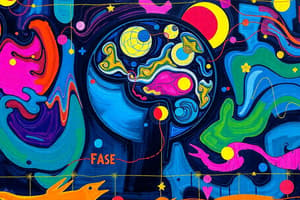Podcast
Questions and Answers
What is the primary purpose of sensory deprivation in physical and mental health-care programs?
What is the primary purpose of sensory deprivation in physical and mental health-care programs?
- To increase sensory stimulation and improve focus.
- To induce a state of deep relaxation and reduce stress. (correct)
- To aid in the retrieval of repressed memories.
- To treat mental illnesses such as depression and anxiety.
What is the primary goal of meditation techniques?
What is the primary goal of meditation techniques?
- To induce a state of deep hypnosis and increase suggestibility.
- To ignore internal distractions and focus on external stimuli.
- To recall repressed memories and relive past experiences.
- To focus on a specific object, word, or one's breathing to achieve relaxation and well-being. (correct)
What best describes normal waking consciousness?
What best describes normal waking consciousness?
- A state of complete distraction and confusion.
- A state defined by disorientation and altered perception.
- A state of consciousness that is organized, meaningful, and clear. (correct)
- A state where one lacks awareness of their feelings and surroundings.
Which of the following is NOT an example of altered states of consciousness?
Which of the following is NOT an example of altered states of consciousness?
What is a significant characteristic of altered states of consciousness?
What is a significant characteristic of altered states of consciousness?
How can altered states of consciousness be induced?
How can altered states of consciousness be induced?
Which of the following best differentiates altered states from normal waking consciousness?
Which of the following best differentiates altered states from normal waking consciousness?
Which statement about the effects of drugs on consciousness is accurate?
Which statement about the effects of drugs on consciousness is accurate?
Which class of psychoactive drugs primarily increases activity in the central nervous system?
Which class of psychoactive drugs primarily increases activity in the central nervous system?
What is a common outcome associated with regular use of psychoactive drugs?
What is a common outcome associated with regular use of psychoactive drugs?
Which psychoactive drug class is known for altering perception and sensation?
Which psychoactive drug class is known for altering perception and sensation?
What defines psychological dependence on a drug?
What defines psychological dependence on a drug?
Which of the following best describes the effect of depressants on the central nervous system?
Which of the following best describes the effect of depressants on the central nervous system?
What term describes the negative experiences associated with reducing or ceasing drug use?
What term describes the negative experiences associated with reducing or ceasing drug use?
Which mechanism is NOT associated with the alteration of consciousness without the use of psychoactive drugs?
Which mechanism is NOT associated with the alteration of consciousness without the use of psychoactive drugs?
What characterizes a state of addiction to a drug?
What characterizes a state of addiction to a drug?
The primary chemical messengers in the body that are affected by psychoactive drugs are known as:
The primary chemical messengers in the body that are affected by psychoactive drugs are known as:
Which of the following best describes an effect of opioids?
Which of the following best describes an effect of opioids?
Normal waking consciousness is characterized by a state that is generally unorganised and unclear.
Normal waking consciousness is characterized by a state that is generally unorganised and unclear.
Altered states of consciousness can occur due to both natural and deliberate induction methods.
Altered states of consciousness can occur due to both natural and deliberate induction methods.
An example of an altered state of consciousness includes being fully present and aware of your thoughts and feelings.
An example of an altered state of consciousness includes being fully present and aware of your thoughts and feelings.
Psychosis is an example of a condition that can lead to an altered state of consciousness where reality is perceived differently.
Psychosis is an example of a condition that can lead to an altered state of consciousness where reality is perceived differently.
The level of awareness during normal waking consciousness is consistent and does not fluctuate throughout the day.
The level of awareness during normal waking consciousness is consistent and does not fluctuate throughout the day.
States of consciousness can only be altered through substances like drugs and cannot be achieved through practices like meditation.
States of consciousness can only be altered through substances like drugs and cannot be achieved through practices like meditation.
Daydreaming is classified among the examples of altered states of consciousness.
Daydreaming is classified among the examples of altered states of consciousness.
Your experience during normal waking consciousness does not contribute to your perception of reality.
Your experience during normal waking consciousness does not contribute to your perception of reality.
What is a significant misconception about hypnosis regarding the control of behavior?
What is a significant misconception about hypnosis regarding the control of behavior?
What is the effectiveness of hypnosis in aiding memory retrieval according to research?
What is the effectiveness of hypnosis in aiding memory retrieval according to research?
Which statement best reflects the common beliefs around the use of hypnosis for behavioral change?
Which statement best reflects the common beliefs around the use of hypnosis for behavioral change?
How does sensory deprivation impact consciousness when prolonged?
How does sensory deprivation impact consciousness when prolonged?
What claim do meditation advocates make regarding its effects?
What claim do meditation advocates make regarding its effects?
What does research suggest about the use of hypnosis in recalling repressed memories?
What does research suggest about the use of hypnosis in recalling repressed memories?
What outcome is commonly associated with prolonged involvement in sensory deprivation?
What outcome is commonly associated with prolonged involvement in sensory deprivation?
What outcome is often contradictory when discussing the effectiveness of hypnosis?
What outcome is often contradictory when discussing the effectiveness of hypnosis?
Flashcards are hidden until you start studying
Study Notes
States of Consciousness
- Consciousness exists on a continuum from normal waking consciousness to altered states of consciousness.
Normal Waking Consciousness
- Characterized by awareness of thoughts, feelings, and surroundings; relatively organized and clear.
- Serves as the baseline for evaluating other consciousness states.
- Fluctuations in awareness can occur, reflecting changes in focus and distraction.
Altered States of Consciousness
- Defined as any state deviating from normal waking consciousness, marked by significant differences in awareness, perceptions, and behaviors.
- Induced by various means, such as meditation, psychoactive drugs, fever, psychosis, daydreaming, and sleep.
Cognition
- In normal waking consciousness, perceptions are typically clear, while altered states can distort sensory input (colors, pain perception).
- Cognitive functions may become impaired, leading to disorganized thoughts and difficulties in problem-solving.
Emotional Awareness
- Normal waking consciousness allows for emotion management; emotions can be heightened or dulled in altered states, sometimes inappropriate to the context.
Self-Control
- Normal waking consciousness facilitates impulse control; altered states may reduce self-control and inhibit rational behavior.
Time Orientation
- Time perception is accurate in normal waking consciousness, while in altered states, the passage of time can feel distorted or unperceived.
Psychoactive Drugs
- Alter states of consciousness through chemical interaction with neurotransmitters in the brain.
- Common types include stimulants, depressants, opioids, and hallucinogens, each with distinct effects on mood and perception.
Tolerance and Dependence
- Tolerance: Increased dosage needed for the same effect, leading to higher consumption.
- Dependence: Regular use can create psychological (daily life integration) or physical (withdrawal symptoms) dependence.
Addiction
- Defined as compulsive drug-seeking behavior despite adverse effects.
Non-Drug Methods of Altering Consciousness
- Changes can be induced through safe activities such as sleep, exercise, and media engagement.
Hypnosis
- A trance-like state induced by suggestion, involving heightened suggestibility and focus.
- Misconceptions include the idea that hypnotists can control behavior against a person's will and the effectiveness of hypnosis for retrieving suppressed memories.
Sensory Deprivation
- Intentional reduction of sensory input to alter consciousness; useful in relaxation but can become distressing if prolonged.
Meditation
- Techniques focusing on specific objects or breathing to foster relaxation and reduce stress.
- Regular practice has been shown to improve mental well-being and stress management, believed to elevate consciousness levels.
States of Consciousness
- Consciousness exists on a continuum from normal waking consciousness to altered states of consciousness.
Normal Waking Consciousness
- Characterized by awareness of thoughts, feelings, and surroundings; relatively organized and clear.
- Serves as the baseline for evaluating other consciousness states.
- Fluctuations in awareness can occur, reflecting changes in focus and distraction.
Altered States of Consciousness
- Defined as any state deviating from normal waking consciousness, marked by significant differences in awareness, perceptions, and behaviors.
- Induced by various means, such as meditation, psychoactive drugs, fever, psychosis, daydreaming, and sleep.
Cognition
- In normal waking consciousness, perceptions are typically clear, while altered states can distort sensory input (colors, pain perception).
- Cognitive functions may become impaired, leading to disorganized thoughts and difficulties in problem-solving.
Emotional Awareness
- Normal waking consciousness allows for emotion management; emotions can be heightened or dulled in altered states, sometimes inappropriate to the context.
Self-Control
- Normal waking consciousness facilitates impulse control; altered states may reduce self-control and inhibit rational behavior.
Time Orientation
- Time perception is accurate in normal waking consciousness, while in altered states, the passage of time can feel distorted or unperceived.
Psychoactive Drugs
- Alter states of consciousness through chemical interaction with neurotransmitters in the brain.
- Common types include stimulants, depressants, opioids, and hallucinogens, each with distinct effects on mood and perception.
Tolerance and Dependence
- Tolerance: Increased dosage needed for the same effect, leading to higher consumption.
- Dependence: Regular use can create psychological (daily life integration) or physical (withdrawal symptoms) dependence.
Addiction
- Defined as compulsive drug-seeking behavior despite adverse effects.
Non-Drug Methods of Altering Consciousness
- Changes can be induced through safe activities such as sleep, exercise, and media engagement.
Hypnosis
- A trance-like state induced by suggestion, involving heightened suggestibility and focus.
- Misconceptions include the idea that hypnotists can control behavior against a person's will and the effectiveness of hypnosis for retrieving suppressed memories.
Sensory Deprivation
- Intentional reduction of sensory input to alter consciousness; useful in relaxation but can become distressing if prolonged.
Meditation
- Techniques focusing on specific objects or breathing to foster relaxation and reduce stress.
- Regular practice has been shown to improve mental well-being and stress management, believed to elevate consciousness levels.
Normal Waking Consciousness
- Characterized by awareness of thoughts, feelings, and surroundings.
- Involves understanding of time, self-identity, and social context.
- Considered an organized and clear state of awareness.
- Serves as a baseline for evaluating other consciousness states.
- Level of awareness can fluctuate throughout daily activities and lessons.
- Focusing on tasks may lead to moments of distraction or drowsiness.
Altered States of Consciousness
- Defined as deviations from normal waking consciousness.
- Marked by changes in awareness, perceptions, memory, emotions, and sense of time and self-control.
- Induced by various factors, including:
- Meditation techniques.
- Psychological substances, like alcohol.
- Physiological conditions such as fever.
- Mental health conditions, particularly psychosis.
- Spontaneous states like daydreaming or sleep.
- Can be culturally significant, often tied to religious experiences.
- May occur both deliberately and naturally.
Studying That Suits You
Use AI to generate personalized quizzes and flashcards to suit your learning preferences.




